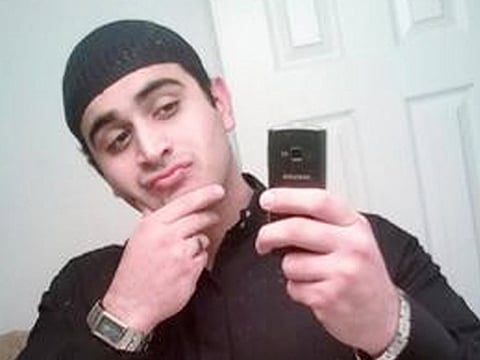Orlando shooter 'violent and prejudiced'
The worst mass shooting in modern US history was carried out by 29-year-old Omar Mateen

ORLANDO: People close to the gunman behind the attack on a nightclub in Florida that left 50 dead paint a picture of a violent and prejudiced young man.
The suspect, 29-year-old Omar Mateen, is a Muslim American of Afghan descent and law enforcement were investigating whether he had ties to or was inspired by extremism, after a source linked to the Daesh claimed the attack.
The FBI said he apparently made a 911 call just before the massacre to claim allegiance to the Daesh group.
Sunday's attack, the worst mass shooting in modern US history, was carried out at Orlando's Pulse nightclub.
But relatives interviewed by US media said Mateen, who worked as a security officer and had a wife and young son, was not especially religious.
They did, however, describe a man who had anti-gay views, mental health problems and was physically abusive to his ex-wife.
Mateen's father, Mir Seddique, said his son had recently been offended to see two men expressing affection on a Miami street.
"We were in downtown Miami, Bayside, people were playing music," the shocked father told NBC News in the immediate aftermath of the shooting.
"And he saw two men kissing each other in front of his wife and kid and he got very angry," Seddique said.
The father is a minor celebrity in Afghan political circles, hosting an occasional television show in which he expressed hardline views.
In the "Durand Jirga Show," available on YouTube, he rails against the Pakistani government and announced a quixotic bid to seek the Afghan presidency.
"We are in shock like the whole country," Seddique added. "This had nothing to do with religion."
'Mentally ill'
Mateen's ex-wife said he was violent and mentally unstable - but not a religious extremist.
"A few months after we were married I saw his instability, and I saw that he was bipolar and he would get mad out of nowhere," Sitora Yusufiy told reporters outside her home in Boulder, Colorado.
"After a few months he started abusing me physically ... not allowing me to speak to my family, keeping me hostage from them."
Yusufiy, who met Mateen online and married him in 2009, said he practiced Islam but showed no signs of radicalization.
"There was no sign of any of this at all," she said.
She noted that Mateen was "mentally unstable and mentally ill" and had a history of steroid use.
Steroids can cause mental problems including paranoia and delusional thoughts.
When they split, "my family literally rescued me... they had to pull me out of his arms and find an emergency flight."
The pair were divorced in 2011, according to a court document seen by AFP, and Yusufiy said she has not had contact with Mateen in years.
Regular at mosque
The imam of the mosque where Mateen worshipped said he came to evening prayers three or four times a week, bringing his son who is about four or five years old.
"He would pray and his son would play," said Syed Shafeeq Rahman of the Islamic Center of Fort Pierce, who has known Mateen since 2003 when he became the imam.
Mateen did not socialise, leaving when services ended.
He didn't talk but would smile and shake hands, Rahman told AFP.
"I never expected this," Rahman said, holding a Koran in his hand as he spoke with reporters. "We teach peace and justice."
"It must be some kind of psychological problem or anger problem," the imam said, adding that Mateen might have been radicalised on the Internet.
The imam's son, however, told the Washington Post that Mateen seemed like "an aggressive person" and worked out regularly.
Mateen owned a small caliber handgun and worked as a guard at a secure facility for juvenile delinquents.
Authorities said he bought a handgun and a long gun two days before the attack.
According to the FBI, Mateen was investigated twice for possible extremist views and contact with a US suicide bomber in 2013 and 2014 but never prosecuted.
According to the Florida Department of Agriculture and Consumer Services website, he had a gun license set to expire in September of next year.
Sign up for the Daily Briefing
Get the latest news and updates straight to your inbox



